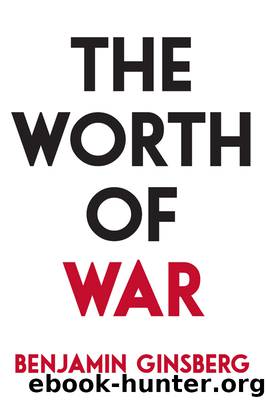The Worth of War by Benjamin Ginsberg

Author:Benjamin Ginsberg
Language: eng
Format: epub
Publisher: Prometheus Books
Published: 2014-07-29T16:00:00+00:00
War gives states reason to mitigate their brutality and even—at least—go through the motions of soliciting citizens’ views on matters of leadership and policy. I would, however, be remiss if I did not address the issue of war and state power—an issue that has begun to loom large for Americans.
War, as the late Charles Tilly often reminded us, expands state power.1 And, for better or worse, power justified by and created for use in war is, more often than not, converted into peacetime uses. Political economist Robert Higgs has shown that in the United States, after each of the world wars, many federal agencies built to support the war effort found new civilian tasks, survived postwar bureaucratic demobilization, and expanded the government's capacity to direct the nation's civilian economy and society.2 Thus, for example, after the end of the First World War, the War Finance Corporation, which had been created to help essential war industries secure adequate financing, lived on until 1925. That year, the agency was officially liquidated but was reborn in 1934 under the name Reconstruction Finance Corporation. Similarly, the Railroad Administration, which operated the nation's railroads during the war, was officially closed in 1920. Many of its powers, however, were then transferred to the Interstate Commerce Commission.
The same pattern was manifest after the Second World War. While many wartime agencies were dismantled, others were quietly renamed or saw their functions and powers transferred to other agencies. Thus, when the Employment Service and the Reemployment and Retraining Administration were closed, their offices and functions were taken over by the Labor Department. When the Foreign Economic Administration was closed, its jurisdiction was assigned to the State Department. The Smaller War Plants Corporation was nominally closed, but was actually absorbed by the Commerce Department. The list goes on. An administrative state built by war redeploys some of its now-excess administrative capacity to regulate the civilian economy.
Some might welcome, or at least be untroubled, by such a postwar expansion of the government's mundane administrative capabilities. However, in a rather perverse conversion of swords into plowshares, coercive capabilities built for war may also be turned to peacetime uses. Indeed, following many periods of significant American military combat, legislation and institutional mechanisms created to further the war effort were not liquidated but were, instead, redirected at the government's domestic foes. Thus, even after the First World War ended, a number of radicals were prosecuted under the Espionage Act, which had been drafted to prevent opposition to the wartime draft. Similarly, the Bureau of Investigation, predecessor to the Federal Bureau of Investigation, was assigned the wartime responsibility of assisting the Committee on Public Information in building a favorable climate of opinion for the war effort by infiltrating and disrupting antiwar and pacifist groups such as the Socialist Party and the Industrial Workers of the World (“Wobblies”). With the end of the war, the Bureau of Investigation was not shut down but was, instead, assigned to investigate Communist influences in the United States. Bureau of Investigation agents led the 1919 and 1920 Palmer Raids aimed at rounding up suspected radicals.
Download
This site does not store any files on its server. We only index and link to content provided by other sites. Please contact the content providers to delete copyright contents if any and email us, we'll remove relevant links or contents immediately.
| Civilization & Culture | Expeditions & Discoveries |
| Jewish | Maritime History & Piracy |
| Religious | Slavery & Emancipation |
| Women in History |
Cecilia; Or, Memoirs of an Heiress — Volume 1 by Fanny Burney(32561)
Cecilia; Or, Memoirs of an Heiress — Volume 2 by Fanny Burney(31958)
Cecilia; Or, Memoirs of an Heiress — Volume 3 by Fanny Burney(31944)
The Secret History by Donna Tartt(19097)
Sapiens: A Brief History of Humankind by Yuval Noah Harari(14392)
Leonardo da Vinci by Walter Isaacson(13339)
The Radium Girls by Kate Moore(12033)
Sapiens by Yuval Noah Harari(5374)
How Democracies Die by Steven Levitsky & Daniel Ziblatt(5221)
The Wind in My Hair by Masih Alinejad(5100)
Homo Deus: A Brief History of Tomorrow by Yuval Noah Harari(4921)
Endurance: Shackleton's Incredible Voyage by Alfred Lansing(4786)
Man's Search for Meaning by Viktor Frankl(4608)
The Silk Roads by Peter Frankopan(4537)
Millionaire: The Philanderer, Gambler, and Duelist Who Invented Modern Finance by Janet Gleeson(4481)
The Rape of Nanking by Iris Chang(4218)
Joan of Arc by Mary Gordon(4116)
The Motorcycle Diaries by Ernesto Che Guevara(4105)
Stalin by Stephen Kotkin(3971)
